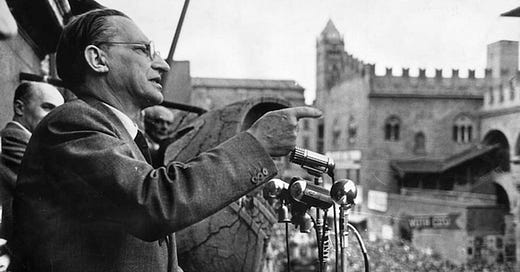De Gasperi speaks to a Bologna rally in 1951
Listen to the podcast on Apple or Spotify.
Italy's rebirth after 20 years of fascism, three years of war, and two years of civil war is one of the 20th century's great under-told stories. In English, there are at least six biographies of Charles De Gaulle, four of Konrad Adenauer, and eight of Benito Mussolini - the man who took Italy into the abyss - but none of Alcide De Gasperi, the Christian Democratic prime minister (1945-53) who shepherded the country out.
Mark Gilbert’s Italy Reborn: From Fascism to Democracy - published today by Penguin - rebalances “the historiographical consensus to some extent about what happened in postwar Europe,” he told me in a New Books Network interview. “The Mediterranean is important; Spanish history is important; Italian history is important but they tend to get neglected compared to France, Germany, and - of course - Britain. I think anybody who reads my book will see that Italy really did matter and that it was the source of fascinating debates”.
From 1945, devastated by war and split politically and economically between north and south and between two mass movements - Communism and Christian Democracy with their superpower backers - Italy could easily have descended into civil war. That it didn’t was due largely to Palmiro Togliatti, the leader of the Communist Party (PCI), and to De Gasperi. From the ashes of war, De Gasperi chose a republican government and a market economy, resisted pressure from the Vatican to ally with the far right, wooed the Americans while pacifying the PCI, won Marshall Aid, and helped found the European communities.
“Sometimes you can read books on contemporary Italian history and almost forget that the Christian Democrats were in power. Well, they were,” says Gilbert. “Between June 1947 and when the book closes in 1954, they were in power almost alone with the assistance of the Republicans and the Social Democrats, but most of the ministerial positions were filled by Christian Democrats. And De Gasperi had a very clear idea throughout that period … that Christian Democracy should be ‘a party of the centre marching to the left’ … You can't give him 10 out of 10 - that would imply perfection which, in the circumstances, would be impossible. I think eight out of 10. You can say he deserves it thoroughly … He was a genuinely pious man, a good man, a man of great integrity, who could be absolutely ruthless when he needed to be”.
“Togliatti was more Machiavellian in the sense that we tend to use it in ordinary conversation. He was very cynical … He'd spent the 1930s in Stalin's Moscow … There's also no doubt that, without Togliatti's relative moderation, De Gasperi and the Christian Democrats could never, on their own, have managed the transition to a democracy”. Despite being huge and well-armed, the PCI resisted internal pressure to launch an insurrection after its expulsion from government and an assassination attempt on Togliatti. He “fights off internal attempts to impose a more insurrectionary line on the party and … follows a Gramscian long-term strategy - winning power through parliamentary means - and keeps the party's resistance to the Christian Democrats within acceptable boundaries. I think both De Gasperi and Togliatti, although they thoroughly detested each other, were fairly conscious of how far they could push each other … Had Italian communism had a more confrontational leader, there might well have been some form of insurrection. An insurrection would have been met by force, probably by the Americans too … They would have had no qualms whatever about imposing and supporting a very right-wing reactionary regime in Italy. If it didn't happen, it's because of this combination between De Gasperi and Togliatti”.
Mark Gilbert is Professor of History and International Studies at SAIS Europe in Bologna. In November 2020, I interviewed him about his European Integration: A Political History (Rowman & Littlefield, 2020 Second Edition).





